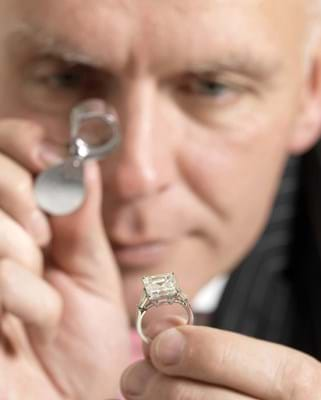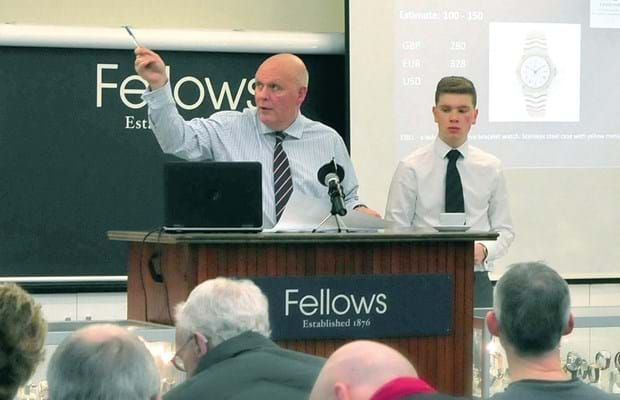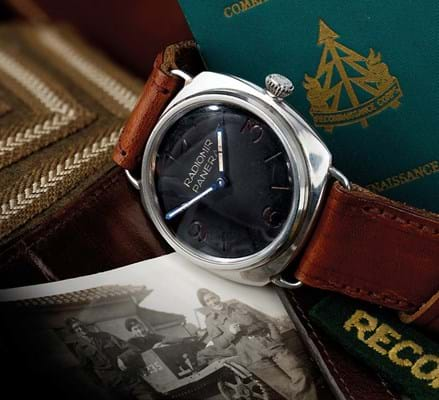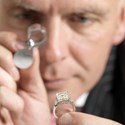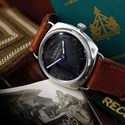“Confident, not complacent,” is how Fellows’ managing director Stephen Whittaker sums up his hopes for 2018. His comment comes as ATG compiled its annual review of regional auction house performance, with the Birmingham firm registering a hammer total of £17m, ensuring it tops the ‘league’ of salerooms that submit figures for the Gazette to report (see front page).
The ‘confidence’ refers to his certainty that Fellows does best by sticking to what it’s good at – jewellery and watches, sold with high levels of customer service. The absence of complacency reflects an honest appraisal of the business challenges facing salerooms, not least an ever-more savvy vendor shopping around for the best place to sell.
Talking to Whittaker is an illuminating experience – he doesn’t dodge tricky questions, such as how much the prospect of Brexit has cost the firm. There’s an impatience too, about industry practices the former army officer feels let the side down.
We meet in a Mayfair hotel close to the firm’s London valuation office and start by looking back at 2017.
What were the success factors in 2017?
Stephen Whittaker: Like any auction house there’s been a fair element of luck. But if someone brings you something really exciting to sell, like the Graff yellow diamond ring [sold by Fellows in December for £1.1m plus buyer’s premium], you hope it’s because you’ve built the reputation of being able to do the job.
At the end of the day, success comes down to our staff – from the lady who cleans the toilets to the staff who handle the online payments and get the parcels out on time.
We have 70 really dedicated staff, some quite young and some of whom are studying in their spare time to uplift their qualifications. I have one staffer who is studying for a PhD in gemmology. As employers, auction houses should take advantage of such dedication to boost standards, so that when people buy from us, they are confident what we are selling is what we said in the description.
We handle huge volumes of goods, so I have very little influence on what we sell. It’s all down to our staff.
“Most auction houses concentrate totally on their specialists. But you need people to market the objects and a good accounts department too
For instance, I had nothing to do with the consignment of the Second World War Panerai diver’s watch [sold in February for £41,000, plus buyer’s premium, pictured above] – that was brought in by Laura Bishop, one of our senior specialists.
You’ve talked recently about Fellows’ investment in customer service.
Our customer service has been a critical success factor for repeat business. For instance, we try to get parcels out within 48 hours. It also irritates buyers if auction houses don’t have automated payment systems, which means they can only pay when the auction house is open.
If auction houses are serious about being online, they’ve got to see what service other online providers give. I don’t think we can aspire to be Amazon, but you have to understand what drives their success.
Most auction houses concentrate totally on specialists – valuers and cataloguers. They have a big part to play, but you’ve also got to have people who will market the objects properly and a good accounts team so vendors get paid quickly.
There’s no one part of Fellows that’s more important than the other.
Any plans to expand beyond 70 staff?
No. In terms of the physical space we occupy, we’re at capacity. The plan is to make those staff better qualified and give them better opportunities to grow within the company.
I’d say about 35 of the 70 are in specialist departments. It splits rather like our turnover – about 60% are in jewellery and 40% in watches.
We had a few people leave the company last year and although they occupied senior positions, when they left they gave opportunities to their colleagues.
How are your sell-through rates faring?
We’re quite lucky in that we sell 74% by volume and 81% by value. Watch sales, however, are more like 90%-90%. I would think the national average is in the mid-60s. But I’m not fussed about that statistic. I am concerned that the buyer and vendor are both happy.
Will the watch market keep growing?
Growth is in value of the watches, not so much in the volume of items coming up for auction. Whereas 18 months ago we would have sold a Rolex Submariner for perhaps £2500, now we sell it for £4000.
Growth is also in the maturity of the market, in that buyers recognise you can go to certain auction houses with confidence and if the auction house says it’s a ‘Rolex 123’, it absolutely is a ‘Rolex 123’.
The emerging geographical markets of most interest are China and the Far East. We have two members of staff who speak both Mandarin and Cantonese – one of them is specifically employed to deal with that market.
Which watch brands have potential?
The UK market very much reflects the watches that are sold on the high street. Rolex is the pre-eminent brand here, closely followed by Patek Philippe, Breitling and Omega. But with online platforms like thesaleroom.com we can reach out and sell other brands such as Vacheron and Jürgensen – watch brands largely unknown in the UK that we are happily selling abroad.
In November 2017, we achieved a record price for a Jürgensen watch, selling it for £36,000 (plus buyer’s premium), fuelled by online bidding, beating the previous record set by Sotheby’s in November 2013.
“Vendors need to realise that high estimates deter buyers. I wonder whether we should have estimates at all
Are you tempted to venture into new collecting areas?
Absolutely not. Our strength lies in the fact that we know and understand jewellery and watches.
We occasionally have an antique furniture sale but our specialisms are jewellery and watches and that’s where our investment and greatest endeavours will be.
How is online performing for Fellows?
Our online sales for 2017 were about £6m, out of £17m total hammer, but the online proportion isn’t growing. I think it’s because we went online very early on and so our online sales have matured.
A big driver for us is the enormous amount of absentee bids we get before an auction.
For a sale with £400,000- 500,000 worth of watches, we’ll have between £1.5m and £2m worth of absentee bids on about 75% of the lots. Inevitably there’s a huge amount of overlap in that, but I know when I get up on the rostrum to host that sale, even if nobody raised a hand, the sale is a success. My job is to see if I can sell the other 25% and maybe uplift the 75%.
We’ve noticed in the past year that there’s been a large number of people bidding on the phone. We’d like to be able to say we won’t take phone lines on anything less than £500, but two-thirds of what we sell is between £200-500 and if buyers want phone lines, we need to service that.
That said, we recognise the online platform is a very strong way to go.
In 2016 you opened a valuation office in Mayfair, London. Are regular auctions in the capital close behind?
We’re under a lot of pressure to do auctions in London but it’s jolly expensive. I’m just trying to work out if we could add value by selling vendors’ goods in London, though we bring them down already for viewings.
Holding auctions of high value items on a ground floor in a hotel seems risky to me. It’s not to say we wouldn’t consider doing it, but the right processes would have to be in place.
In the world of online sales, is holding auctions in London necessary?
It’s very competitive in the middle market. You’d have to be pretty convinced what you have warrants a London sale. If, however, you have an amazing collection of ceramics, handbags, jewellery and so on, there is a case to bring it to London.
There’s a greater density of wealth in the capital, but there are so many others in that marketplace, you’d have to do the maths quite carefully.
Asian art – how do you view that area now?
I’m always sceptical on subject matters I don’t know a great deal about! Thankfully we don’t do dedicated Asian art sales. There are some great auction houses dealing with Asian art and good luck to them.
There is a finite amount of ‘product’ out there so inevitably it is a market that will continue to go up in value, provided the Far Eastern economies continue to do well.
But eventually the supply has to diminish, particular in the UK as the generation that inherited all the oriental works of art from their forebears in late 19th century passes on.
What’s your strategy on estimates?
It’s trying to achieve a balance between setting attractive estimates to bring people to auction and managing vendor expectations. In our world, if it’s a good watch or piece of jewellery, it will have been shown to two or three auction houses to see who will offer the highest estimate. The vendor understandably wants to get the highest price.
What they don’t realise is that setting a high estimate may deter half the market from viewing that particular piece. It’s a hard conversation to have with a vendor of a significant piece. If they’re prepared to be brave, they probably will be rewarded.
I wonder whether we should have estimates at all.
“There’s no question in my mind that Brexit is wrong for the UK
You’ve said recently that auctioneers need to be wary of increasing their fees.
If auctioneers want to increase their buyer’s premium, they need to be providing an increased service. You can’t just put fees up because you perceive a vacuum between you and senior auction houses.
You can occupy that space below them if you are offering a comparable level of service and a comparable level of technical and professional expertise.
Otherwise all you’re doing is victimising the buying public and they will vote with their feet.
Last January’s ASA ruling on buyer’s premium – how did that affect Fellows?
It was disappointing as it suggested there was a sleight of hand by auction houses in hiding fees from buyers, which we don’t and most know about buyer’s premium already.
The ASA ruling was advisory, not statutory, but Fellows has embraced it. We put our buyer’s premium next to every estimate and at the bottom of every catalogue page.
If it removes any confusion about what buyers are paying at auction, that may be the advantage.
But it struck me as a very blunt hammer to take to something I didn’t see as a problem.
Is Brexit a good thing for Fellows?
Absolutely not! Leaving aside whether we should stay or go, it is causing uncertainty. By comparing sales in one year against the other, we know every time our politicians exercise some element of democracy, like an ‘unnecessary’ general election or a Brexit vote, each time we calculate it has cost us £150,000- 200,000 in profit.
That’s because for six weeks before and after, people freeze and sales go down. It causes uncertainty in the market, which we don’t need when you realise no one actually needs what we’re selling.
And then there’s the uncertainty over EU nationals remaining in the UK…
We have staff members who are European by birth and are nervous about their future here. We need to be certain their employment rights in the UK remain the same. After the Brexit vote I emailed them to say, ‘we will move heaven and earth to keep you’. There’s no question in my mind that Brexit is wrong for the UK. We will just have to watch the legislation when it comes.
Whom do you respect in the market place?
Rodney Tennant, for turning his business into a destination. He has coach-loads of people who come and have lunch and then buy at his fantastic auctions. He’s one of the standard bearers for the auction industry.
And I have the greatest respect any dealer surviving in the market right now – it’s very hard out there. They have big challenges accessing fresh goods to the market. Which is why as auction houses, we have to be very careful about the fees we charge.
How are Fellows’ dealings with the trade?
Good – and they’re the ones we can rely on to turn up to turn up to bid in the saleroom! Auctioneers need them and they need us – though you couldn’t tell this by the sniping in the letters page of the Gazette.
They will ask for discounts, of course. When it comes to those who sell with us regularly, we them their results at the end of the year and how much profit we made against their reserves. And I say, before you ask me to reduce my commission, please have a look at what we earned you in the past year. I don’t think that’s an unfair thing to do.
Your thoughts on gender diversity in the art market?
I believe there is no glass ceiling for women in the art market. There are some great examples of women at the top of their profession – Helen Carless of Lawrences of Crewkerne, the Tennant family and the recent appointment of Jean Ghika at Bonhams to take over worldwide responsibility for their fantastic jewellery auctions.
I’d like to feel lower down the scale that female employees have the same opportunities.
Laura Butler, mentioned earlier, started as receptionist, went on to be a PA, then a cataloguer and is now a senior specialist who brought in the Panerai. And when the BBC came to film, she’s the one we put in front of the camera. If a bloke had done the same thing, they would get the same credit but they probably wouldn’t have started as a receptionist.
I do wonder – and I’ve no empirical evidence for this – if auction houses remunerate female staff as well as their male colleagues. But overall, the prospects for female employees in the art market are fantastic.
Reasons to be cheerful about 2018?
We have great staff and had a very successful 2017, which in itself may bring benefits in 2018. We know what we want to do in 2018 in terms of improving our company, with investments in staff training, more CCTV, computer technology and improving our website. Providing we don’t misstep or do anything to upset the market, which is a sensitive one, we will be fine.
See next week’s issue for part 2 of ATG’s ‘UK Auction Report 2018’ featuring exclusive online trends and statistics


